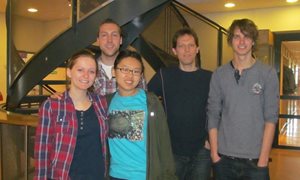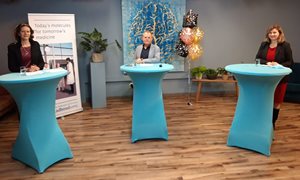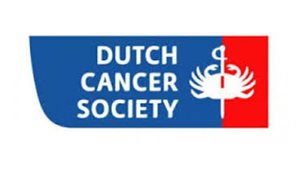 Christian Büll (photo), Natasja Balneger and Gosse Adema from the Radiotherapy and OncoImmunology Laboratory (ROI) of the Department of Radiation Oncology, theme Cancer development and immune defense, found that sialic acid sugars on the surface of cancer cells modulate the tumor microenvironment and limit the anti-tumor immunity. Blocking the expression of sialic acids in tumors with a sialic acid mimetic enhanced anti-tumor immunity alone or in combination with existing immunotherapies. This collaborative work together with the groups of Thomas Boltje (Molecular Chemistry) and Johan van der Vlag (Nephrology) was recently published in Cancer Research.
Christian Büll (photo), Natasja Balneger and Gosse Adema from the Radiotherapy and OncoImmunology Laboratory (ROI) of the Department of Radiation Oncology, theme Cancer development and immune defense, found that sialic acid sugars on the surface of cancer cells modulate the tumor microenvironment and limit the anti-tumor immunity. Blocking the expression of sialic acids in tumors with a sialic acid mimetic enhanced anti-tumor immunity alone or in combination with existing immunotherapies. This collaborative work together with the groups of Thomas Boltje (Molecular Chemistry) and Johan van der Vlag (Nephrology) was recently published in Cancer Research.
Publication: Link.
Christian Bull
Natasja Balneger
Gosse Adema
Cancer cells cover their surface with a dense layer of sialic acid sugars that contribute to multiple aspects of the disease. Sialic acids support cancer cell development, migration and metastasis and several studies suggest that these sugars contribute to the formation of an immunosuppressive tumor microenvironment which limits the immune system's natural capacity to detect and eradicate cancer cells. In this recent work, the team of Gosse Adema and coworkers used a sialic acid mimetic to block sialic acid expression in mouse tumor models. They found that sialic acid blockade with this compound was especially effective in tumor cells leading to a strong reduction in tumor growth. Strikingly, treatment with the sialic acid mimetic increased the number of effector CD8+ T cells in the tumor microenvironment while reducing the number of immunosuppressive cells. Further mechanistic studies showed that sialic acid blockade facilitated the interaction between effector CD8+ T cells and tumor cells leading to enhanced tumor destruction. Sialic acid blockade treatment synergized with CD8+ T cell transfer and other forms of immunotherapy directed at inducing anti-tumor immune responses. Altogether, this study emphasizes the crucial role of sialic acids in tumor immune evasion and provides proof of concept that sialic acid blockade creates a tumor microenvironment permissive for CD8+ T cell-mediated tumor immunity.
Related news items

RIMLS awards call for nominations
19 October 2021 RIMLS awards several prizes to stimulate and honor our (young) researchers. Upcoming awards are Supervisor of the Year, Best Master Thesis, Best Publication, Best Image and more. Send your nominations now before 24 November 2021. go to page
Miniaturized microfluidic platform for automated epigenetic profiling
6 May 2021 Together with Fluidigm, a US-based company focusing on microfluidics, the team of Hendrik Marks publishes in Genome Research the development of a powerful plug and play ChIP-seq platform for minute amount of cells, such as embryonic specimens or small biopsies. go to page
RIMLS online award ceremony proudly presenting the winners
13 January 2021In this special webinar of the RIMLS New Year Celebration, scientific director René Bindels reviewed 2020 and looked forward to 2021. But more importantly a number of researchers received prizes in the traditional RIMLS awards ceremony.
go to page
RIMLS PhD retreat registration is open
23 January 2020 Yearly, RIMLS PhD candidates gather for the two-day PhD Retreat. Apart from the science, this event is highly valued for the opportunity to meet and get to know fellow PhD candidates during the social activities. Early bird registration and abstract submission deadline: 4 March 2020. go to page
RIMLS awards call for nominations
26 November 2019 RIMLS awards several prizes to stimulate and honor our (young) researchers. Please find here an overview of the upcoming awards. Deadline 12 December 2019. go to page
